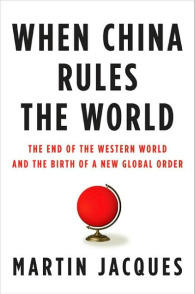 When China Rules the World
When China Rules the World

According to even the most conservative estimates, China will ascend to the position of world economic leader by 2050. In this far-reaching and original investigation, Jacques offers provocative answers to some of the most pressing questions about China's growing place on the world stage.
List of Figures ix
List of Maps xii
List of Tables xiii
List of Illustrations xiv
Acknowledgements xv
Note on Transliteration, Names and Currency xxiv
Major Periods in Imperial China xxv
The Changing of the Guard 1
I THE END OF THE WESTERN WORLD
The Rise of the West 23
Japan-Modern But Hardly Western 46
China's Ignominy 70
Contested Modernity 100
II THE AGE OF CHINA
China as an Economic Superpower 151
A Civilization-State 194
The Middle Kingdom Mentality 233
China's Own Backyard 272
China as a Rising Global Power 316
When China Rules the World 363
Concluding Remarks: The Eight Differences that Define China 414
Appendix - The Overseas Chinese 436
Guide to Further Reading 438
Select Bibliography 442
Notes 469
Index
|
|
Reviews by G. John Ikenberry on Foreing Affairs
With the prospect of China's economy surpassing the United States' in less than 20 years, the great debate today is over whether China will integrate into the existing world order or seek to transform it. Invoking the grand logic of the rise and fall of great powers, Jacques, a journalist, makes the case that China will dominate and reshape the global system. He argues that although China's first steps toward global preeminence are economic, eventually its political and cultural influence will be even greater -- and that, overall, "China's impact on the world will be at least as great as that of the United States over the last century, probably far greater." Jacques also claims that Beijing appears to offer the world an alternative route to modernity -- and therefore a different vision of world order. Having adopted the trappings of Western capitalism while embracing a more illiberal conception of social order, China is modernizing, not westernizing. Therefore, Jacques argues, its coming hegemony will reorient politics and society. But the book is better at describing differences between the East and the West -- their cities, customs, values -- than alternative logics of global order. It does not explore in any depth what it will mean for China to become a global hegemon. Hegemony involves building a system of institutions that other states seek to join, overseeing an extensive system of alliances, and providing public goods. The United States' liberal orientation has facilitated its leadership. It remains to be seen whether China can build a Pax Sinica without an open, rule-based world order. |